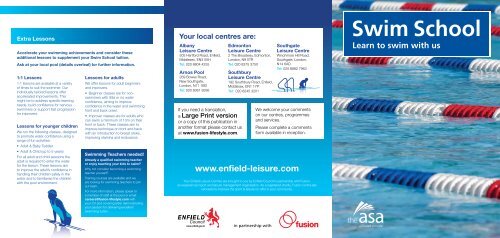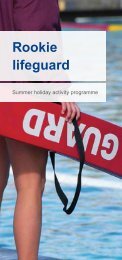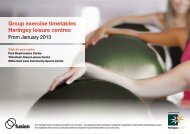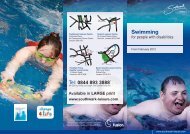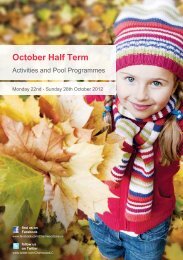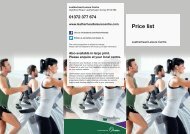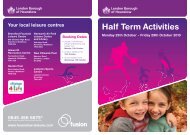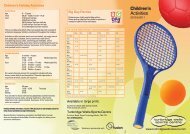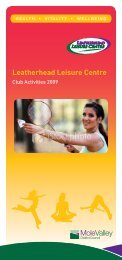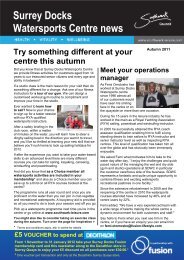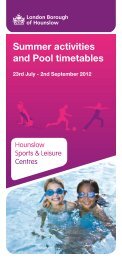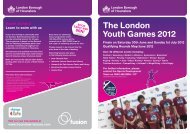Swim School info (pdf 356kb) - Fusion Lifestyle
Swim School info (pdf 356kb) - Fusion Lifestyle
Swim School info (pdf 356kb) - Fusion Lifestyle
You also want an ePaper? Increase the reach of your titles
YUMPU automatically turns print PDFs into web optimized ePapers that Google loves.
Extra Lessons<br />
Accelerate your swimming achievements and consider these<br />
additional lessons to supplement your <strong>Swim</strong> <strong>School</strong> tuition.<br />
Ask at your local pool (details overleaf) for further <strong>info</strong>rmation.<br />
1:1 Lessons<br />
1:1 lessons are available at a variety<br />
of times to suit the swimmer. Our<br />
individually tailored lessons offer<br />
accelerated improvements. This<br />
might be to address specific learning<br />
needs, build confidence for nervous<br />
swimmers or support fast progression<br />
for improvers.<br />
Lessons for younger children<br />
We run the following classes, designed<br />
to promote water confidence using a<br />
range of fun activities:<br />
• Adult & Baby Toddler<br />
• Adult & Child (up to 5 years)<br />
For all adult and child sessions the<br />
adult is required to enter the water<br />
for the lesson. These lessons aim<br />
to improve the adult’s confidence in<br />
handling their children safely in the<br />
water and to familiarise the children<br />
with the pool environment.<br />
Lessons for adults<br />
We offer lessons for adult beginners<br />
and improvers.<br />
• Beginner classes are for nonswimmers<br />
with little or no water<br />
confidence, aiming to improve<br />
confidence in the water and swimming<br />
front and back crawl.<br />
• Improver classes are for adults who<br />
can swim a minimum of 10m on their<br />
front or back. These classes aim to<br />
improve technique on front and back<br />
with an introduction to breast stoke,<br />
improving stamina and endurance.<br />
<strong>Swim</strong>ming Teachers needed!<br />
Already a qualified swimming teacher<br />
or enjoy teaching your kids to swim?<br />
Why not consider becoming a swimming<br />
teacher yourself?<br />
Training courses are available and we<br />
are looking for swimming teachers to join<br />
our team.<br />
For more <strong>info</strong>rmation, please speak to<br />
a member of staff at the pool or email<br />
careers@fusion-lifestyle.com with<br />
your CV and covering letter demonstrating<br />
your passion for delivering excellent<br />
swimming tuition.<br />
Your local centres are:<br />
Albany Edmonton Southgate<br />
Leisure Centre Leisure Centre Leisure Centre<br />
505 Hertford Road, Enfield, 2 The Broadway, Edmonton, Winchmore Hill Road,<br />
Middlesex, EN3 5XH London, N9 0TR Southgate, London,<br />
Tel: 020 8804 4255 Tel: 020 8375 3750 N14 6AD<br />
Tel: 020 8882 7963<br />
Arnos Pool Southbury<br />
269 Bowes Road, Leisure Centre<br />
New Southgate, 192 Southbury Road, Enfield,<br />
London, N11 1BD Middlesex, EN1 1YP<br />
Tel: 020 8361 9336 Tel: 020 8245 3201<br />
If you need a translation,<br />
a Large Print version<br />
or a copy of this publication in<br />
another format please contact us<br />
at www.fusion-lifestyle.com.<br />
www.enfield-leisure.com<br />
Your Enfield Leisure Centres are brought to you by Enfield Council in partnership with <strong>Fusion</strong>,<br />
an experienced sport and leisure management organisation. As a registered charity, <strong>Fusion</strong> continually<br />
reinvests to improve the sport & leisure on offer in your community.<br />
in partnership with<br />
We welcome your comments<br />
on our centres, programmes<br />
and services.<br />
Please complete a comments<br />
form available in reception.<br />
<strong>Swim</strong> <strong>School</strong><br />
Learn to swim with us
Learn to swim with us in your local pool<br />
The national governing body for swimming, the Amateur <strong>Swim</strong>ming Association (ASA)<br />
has developed a comprehensive National plan for Teaching <strong>Swim</strong>ming (NpTS).<br />
All our swim instructors follow this plan and as such we offer the very best in swim<br />
tuition from encouraging non swimmers to take their first splash to developing an<br />
advanced water competence.<br />
To celebrate swimmers’ achievements as they learn, the ASA’s awards structure<br />
applies (see our frequently asked questions for details).<br />
Under 5 years? 5 years and over?<br />
The NPTS starts with FOUNDATION The NPTS goes on to set out stages of<br />
a programme for developing early years learning from 1-7 that teach students<br />
water confidence encouraged through FUNDAMENTAL MOVEMENT SKILLS<br />
sessions such as ‘adult and baby’ and from basic water safety at stage 1 to<br />
‘pre-school’. The emphasis is on the developing a quality stroke technique<br />
development of basic skills and an for 100 metres at stage 7. Whilst our<br />
introduction to water and the swimming swimming lessons are open to people of all<br />
environment through fun and games. ages, these 7 stages have been developed<br />
by the ASA with an emphasis on learning<br />
through fun. They recognise that learning<br />
this way encourages swimmers to continue<br />
with the lesson plan.<br />
The ASA’s National Plan for Teaching <strong>Swim</strong>ming<br />
At each stage of the ASA’s NpTS, all skills are crucial. Given this, all outcomes for the current<br />
stage must be comfortably achieved prior to moving on to the next. All swimmers advance at<br />
a pace individual to them and the ASA’s NpTS Awards link to each of the 7 stages.<br />
1<br />
2<br />
3<br />
4<br />
5<br />
6<br />
7<br />
Developing basic safety awareness, the ‘class’ scenario,<br />
basic movement skills and water confidence skills.<br />
<strong>Swim</strong>mers may use aids, e.g. arm bands, floats etc.<br />
Developing safe entries to the water, including jumping in,<br />
basic floating, travel and rotation unaided to regain upright positions.<br />
<strong>Swim</strong>mers may use aids, e.g. arm bands, floats etc.<br />
Developing safe entries including submersion,<br />
travel up to 10 metres on the front and back, progress rotation skills<br />
and water safety knowledge.<br />
Developing the understanding of buoyancy through a range of skills,<br />
refining kicking technique for all strokes, and swimming 10 metres<br />
to a given standard as directed by the ASA.<br />
Developing ‘watermanship’ through sculling and treading water skills,<br />
and complete rotation, also performing all strokes to the given standard<br />
as directed by the ASA.<br />
Developing effective swimming skills including coordinated breathing;<br />
developing the water safety aspects and understanding of preparation<br />
for exercise.<br />
Developing quality stroke technique up to 100 metres, incorporating skills<br />
learnt and combining them to develop a linked routine and complete<br />
successfully an obstacle course that combines a variety of skills<br />
accomplished throughout stages 1 – 7.<br />
Achieved Stage 7?<br />
Once swimmers have developed the core range of skills required to be confident,<br />
competent and safe in water through stages 1 – 7, there is a choice to then take part in a<br />
variety of different aquatic disciplines in the FUNDAMENTAL SPORT SKILLS stages.<br />
These are stages 8 – 10 of the NPTS and are available in the disciplines of competitive<br />
swimming, water polo, synchronised swimming, diving and rookie lifesaving for juniors.<br />
Please check with your local pool to see which FUNDAMENTAL SPORTS SKILLS stages<br />
are currently available.<br />
Frequently asked questions<br />
What is the NPTS? When does a swimmer move<br />
• It is the national syllabus produced by the into the next group?<br />
national governing body for swimming, the • <strong>Swim</strong>mers move up to the next group<br />
Amateur <strong>Swim</strong>ming Association (ASA) to assist<br />
and support the delivery of swimming lessons.<br />
when they have passed an NPTS stage.<br />
• It is a single pathway for swimmers<br />
to learn how to be competent and confident<br />
in the water.<br />
What happens after a swimmer has<br />
completed ALL stages of the NPTS?<br />
(up to and including stage 10)<br />
• It is a multi skill programme for swimming<br />
and water proficiency. Once competent<br />
in water, swimmers are able to participate in<br />
• You will be signposted to local clubs<br />
and local initiatives that offer progression<br />
opportunities.<br />
a range of aquatic sports such as competitive<br />
swimming, diving, synchronised swimming,<br />
water polo, rookie lifesaving & triathlon.<br />
How long will it take to pass each stage?<br />
• This will vary with every swimmer.<br />
• If a child has the experience of pre-school<br />
What awards or stages<br />
are included in the NPTS?<br />
or Adult & Child sessions then he / she<br />
may move faster initially through the NPTS<br />
• The NPTS includes Foundation Phase<br />
stages 1 & 2 as they will be familiar with<br />
(Adult & Child, ASA Duckling Awards), plus the environment and possibly confident in<br />
there is an additional phase of Alpha Awards the water.<br />
between Foundation and NPTS stage 1<br />
to support adults lacking water confident<br />
or to support for those with a disability.<br />
• <strong>Swim</strong>mers must be competent in all<br />
outcomes at each stage. Stages have 10+<br />
outcomes so it does take time for swimmers<br />
• The core, FUNDAMENTAL MoVEMENT skills to progress to the next stage.<br />
are NPTS stages 1 – 7.<br />
• The FUNDAMETAL SpoRT SkILLS are the<br />
discipline specific stages 8 – 10 and include<br />
an introduction to competitive swimming,<br />
diving, water polo, synchronised swimming<br />
and rookie lifeguarding.<br />
Why might swimmers be playing games<br />
instead of swimming widths / lengths?<br />
• Through games, swimmers have FUN<br />
and learn important skills. If swimmers are<br />
having FUN they enjoy what they are doing<br />
and often learn faster.<br />
When does a swimmer achieve<br />
an award?<br />
Is there any literature I can read<br />
• A swimmer must pass all outcomes<br />
for a stage before they can achieve<br />
an award.<br />
• The outcomes MUST be performed to a<br />
standard that is stipulated by the ASA NpTS.<br />
on the NPTS?<br />
• A parent’s Guide to the NpTS is available<br />
to buy in centre. Further <strong>info</strong>rmation<br />
is also available on the ASA’s website<br />
www.britishswimming.org or by calling<br />
their Awards Centre on 0800 220292.


